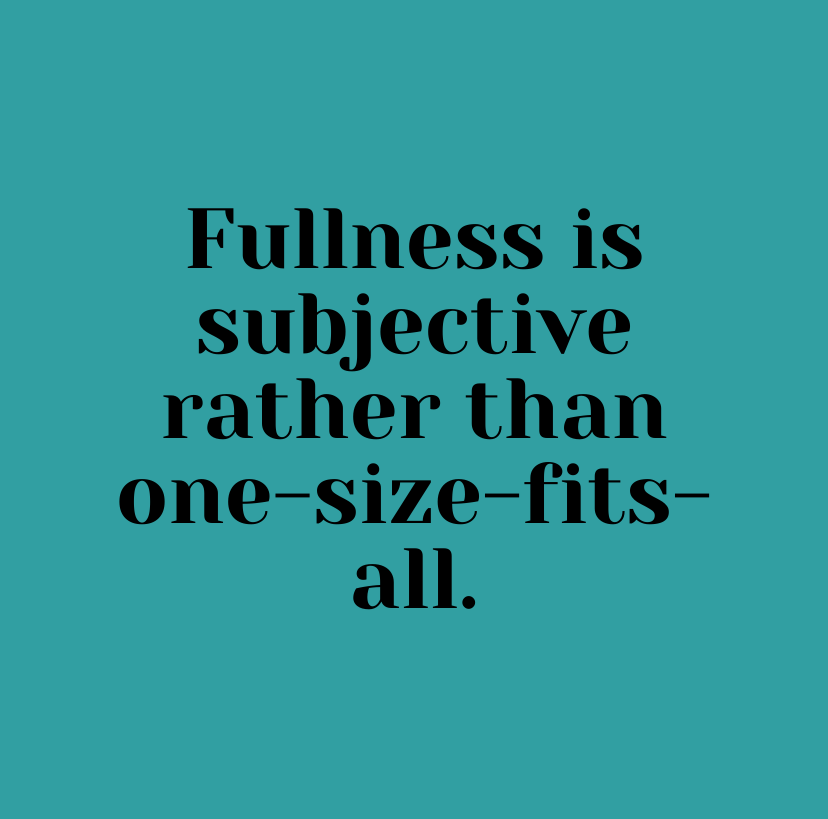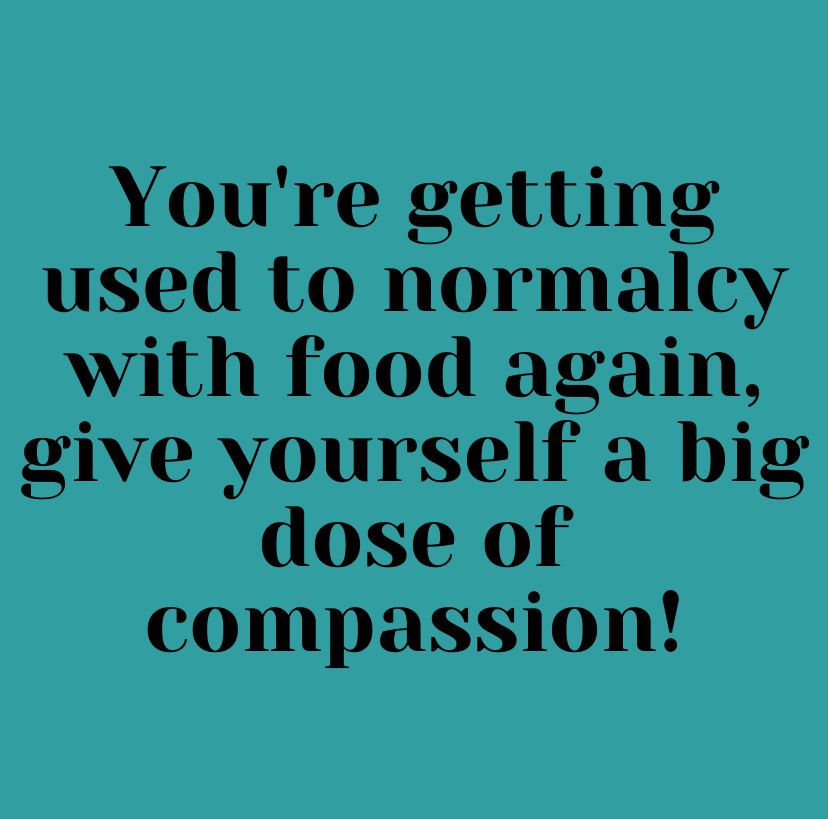Understanding Feelings of Fullness
May 27, 2021
Raise your hand if feeling full has ever given you a rush of anxiety and guilt. You ate a meal and BAM, you’re hit with slight panic. Why am I so full? Did I eat too much?
Diet culture screams that hunger is an indication of self-control. A full stomach on the other hand, is considered defeat – especially if you veered off your “plan.”
Diet culture has conditioned us to fear our need and desire for food. Yet we innately have the physiological capability of determining when we’ve had enough to eat. Fullness is a good sign.
Understanding your own feelings of fullness will allow you to see what a wonderful gift it is to meet your body’s most basic biological need!
“Feel the Fullness” is one of the 10 principles of intuitive eating. Fullness is supposed to be experienced multiple times every day – it’s a part of life!
Let’s take a deep dive into this topic.

What Does Fullness Feel Like?
When you eat a meal, fullness is the physical sensation of satiety. It’s your body registering that you’ve reached the point where you’ve comfortably had enough food to eat.
Feelings of fullness are cues and signals that adapt and change based on your body’s energy needs. Fullness is subjective rather than one-size-fits-all. Environment, circumstances, physical activity, sleep, food eaten earlier in the day, and hormonal changes all play a role.
Fullness is a range, with varying degrees. Sometimes you wish you had more to eat and sometimes you feel stuffed, missing the mark. That’s OK!
You want to feel pleasantly full, but the goal isn’t to achieve perfection every time. The bigger picture is about growing trust with your body as you listen and respond to what it’s telling you.
While only you know your body – general indicators can be used to gauge where you’re at during the process of eating.
Signs of Fullness
- You can physically feel that you’ve gained more energy from your food.
- You lose interest in your food, your taste for it isn’t as exciting, and you’re not thinking about it as much.
- You’re no longer hungry and you’re comfortably filled, but not to the point of pain or discomfort. Your stomach starts to appear a bit more rounded and stretched – that’s normal!
- You’re satisfied with your meal and can move on, devoting your attention to other things.
As you keep practicing, it gets easier to recognize your body naturally guiding you to find that spot where you feel best.

Remember that day-to-day life changes! Here are a few examples of outside factors that might influence the level of fullness you’re aiming for.
- There’s a long day of work ahead and your lunch break will be later than usual. You want to be sustained until then, so you eat a more filling breakfast.
- You choose to forgo a second helping of dinner because you’re looking forward to dessert. You know you’ll feel too stuffed if you choose both.
- Your class presentation is around your lunch time and you have an upset stomach from nerves. You eat half of your lunch to hold yourself over and finish the rest after class once your stomach calms down.
Disordered Eating and Dieting Affects Your Feelings of Fullness
Eating disorders, disordered eating, and chronic dieting can disrupt, interfere, and hinder your natural fullness cues. Meals usually end in one of two ways:
- You’re still hungry, but you ignore your body asking for more food.
- You’re uncomfortably full, but you keep eating since you already blew your diet.
When food rules run the show you only eat what’s “allowed” which results in extremes and opposite sides of the spectrum.
Overriding your cues eventually causes your body to give up and stop sending signals. This is why understanding your feelings of fullness in recovery can be so hard!
The good news is that your cues are fully repairable and your body is extremely resilient! Nourishing yourself with regular meals and snacks throughout the day while using an intuitive eating tool like the hunger and fullness scale is a great place to start. Our skilled dietitians can help you with this!

Emotional Response to Fullness vs. Real Fullness
It’s common for anxiety to follow a meal when you’re struggling with disordered eating. Do you ever wonder if the fullness you feel is a function of your anxiety rather than the type or amount of food you ate?
Your gastrointestinal (GI) system is directly connected to your brain. Anxiety is often linked to stomach issues because your gut is sensitive to emotion. When you’re anxious and stressed your digestive discomfort heightens, making your fullness seem worse than it is. Undereating also causes your GI system to slow down, leading to early satiety and bloating.
When you’re first starting out in recovery, you may think you should be responding to your fullness cues and therefore stop following your RD-prescribed meal plan. However, at the start of treatment responding to your fullness cues appropriately may not be achievable yet.
Anxiety, premature fullness, slow digestion, and GI disturbances can all appear and be mistaken as fullness. It’s best to consult with your RD so you can decide together whether or not following your own fullness cues or continuing on your current meal plan is best.
Real fullness stems from adequate food intake whereas an emotional response to fullness is related to anxiety’s impact on you. To differentiate the two types of fullness it’s important to rely on your brain knowledge, especially in the early stages of recovery.
Recognizing that the meal you ate was an appropriate and proper amount will help you sit with your fullness knowing it’s just what your body needs. You’re getting used to normalcy with food again, give yourself a big dose of compassion!

You’re Saying My Fullness Is a Good Sign?
YES! Fullness is a sign of nourishment and self-care! When you begin to understand what fullness looks like for you, you’re strengthening your ability to confidently eat intuitively with more enjoyable eating experiences!
Check in with yourself throughout the day and begin to get curious about how you feel. If you’re unsure about fullness and are interested in having support from a non-diet registered dietitian, come say hello, our team is ready for you!
Leave a Reply Cancel reply
designed by morgan sinclair designs
privacy policy
//
meet the team
Nutrition counseling
contact
Blog
Monthly Newsletter
Sign up for our
office locations
Phone number
248-686-0340
fax number
248-655-7478
43334 W. 7 Mile Road, Suite 300, Northville, MI 48167
book initial session
8949 Dixie Hwy
Clarkston, MI 48348